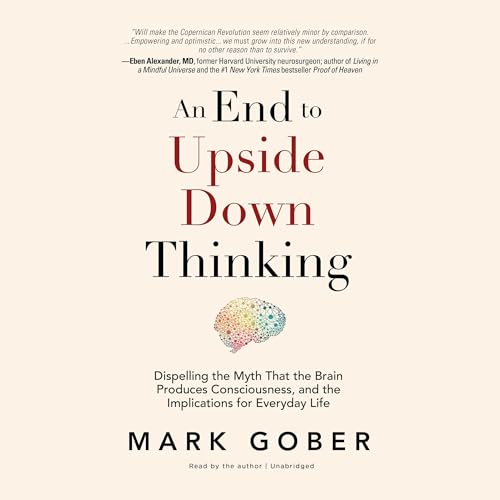
An End to Upside Down Thinking
Dispelling the Myth That the Brain Produces Consciousness, and the Implications for Everyday Life
Échec de l'ajout au panier.
Échec de l'ajout à la liste d'envies.
Échec de la suppression de la liste d’envies.
Échec du suivi du balado
Ne plus suivre le balado a échoué
Obtenez gratuitement l’abonnement Premium Plus pendant 30 jours
Acheter pour 26,86 $
-
Narrateur(s):
-
Mark Gober
-
Auteur(s):
-
Mark Gober
À propos de cet audio
Consciousness creates all material reality. Biological processes do not create consciousness. This conceptual breakthrough turns traditional scientific thinking upside down. In An End to Upside Down Thinking, Mark Gober traces his journey - he explores compelling scientific evidence from a diverse set of disciplines, ranging from psychic phenomena to near-death experiences to quantum physics and beyond. With cutting-edge thinkers like two-time Nobel Peace Prize nominee Dr. Ervin Laszlo, chief scientist at the Institute of Noetic Sciences Dr. Dean Radin, and New York Times best-selling author Larry Dossey, MD, supporting this thesis, this book will rock the scientific community and mainstream generalists interested in understanding the true nature of reality.
Today's disarray around the globe can be linked, at its core, to a fundamental misunderstanding of our reality. This book aims to shift our collective outlook, reshaping our view of human potential and how we treat one another. The book's implications encourage much-needed revisions in science, technology, and medicine. General listeners will find comfort in the implied worldview, which will impact their happiness and everyday decisions related to business, health, and politics.
Stephen Hawking's A Brief History of Time meets Eckhart Tolle's The Power of Now.
©2018 Mark Gober (P)2018 Waterside Productions, Inc.Great Overview of a Difficult Subject to Define - Conciousness
Un problème est survenu. Veuillez réessayer dans quelques minutes.
Interesting and engaging
Un problème est survenu. Veuillez réessayer dans quelques minutes.
But that’s true for many other science enigmas.
Problem is that on this unknown, the author, superficially states subtly possible conclusions that repeated on and on, like a Goebbels’ speech, ends up in wildly simplified concepts like “I and God…God and I… are the same”.
It’s old thinking because mentions research or quotes from 1930, ‘50 or ‘70. Specially concerning in areas like Psychology, Physics or Ethics, where there was a lot of advance in defining what we know or at least what we don’t. Example: Physicist now know that the matter at atomic level it’s way more complex like just atoms and electrons; but claim saying there’s a only empty space in the molecule it’s ignorance what, yes, we learn from the ‘90, when the tunnel effect microscope was invented.
Inconsistency because it use a overwhelming Casuistic approach when simultaneously mentioned statistics almost cited on argument convenience approach. But furthermore, like a somewhat methodological protective “umbrella”, often labelled Casuistic, as stats “anomalies “ that merits further research “to be confirmed.
(I think such an ample cautionary statement, you can even venture saying that the author’s Mom was virgin, as mine too)
Hidden Agenda. I tried to research about the author’s career and achievements. I don’t have the CIA or FBI resources. I’m a normal average guy with limited time just trying healthy Critical Thinking to filter who and why something was written before putting those ideas in my mind as valid.
No, I couldn’t find the author’s resume, like we all have one. Only found a 12 lines Press Release alike summary.
Even worst mentioning the Thesis topic, mentioned that he wrote on a Nobel Prize topic. So if you read carelessly, you’d read that he coauthored or shared the Nobel Prize.
Finally, he quotes tirelessly all time the same “bunch” of professionals, and every time their degrees or unrelated achievements. We have so many examples of Phds or Astronauts, writing so many weird things. The author even quotes Allan Turing on a very random quote very unrelated with his courageous genial career.
Maybe I am wrong, but for me this author a very successful book to make money.
So, if the author just wrote a best seller to make money, he deserves respect.
Because this book is a money maker.
Ps: I venture that the author’s consciousness is not in his brain (like he confirmed; his consciousness is probably located in his chest; right close to his WALLET.
Superficial, old thinking, inconsistent. Writer’s hidden agenda?
Un problème est survenu. Veuillez réessayer dans quelques minutes.
Superstitious nonsense pretending it's science
Un problème est survenu. Veuillez réessayer dans quelques minutes.
The whole book is a quote as stated at the beginning, so why must ever line begin and end with “quote, end quote”. Just can not bare this…deleted.
Narrator is beyond bad
Un problème est survenu. Veuillez réessayer dans quelques minutes.

